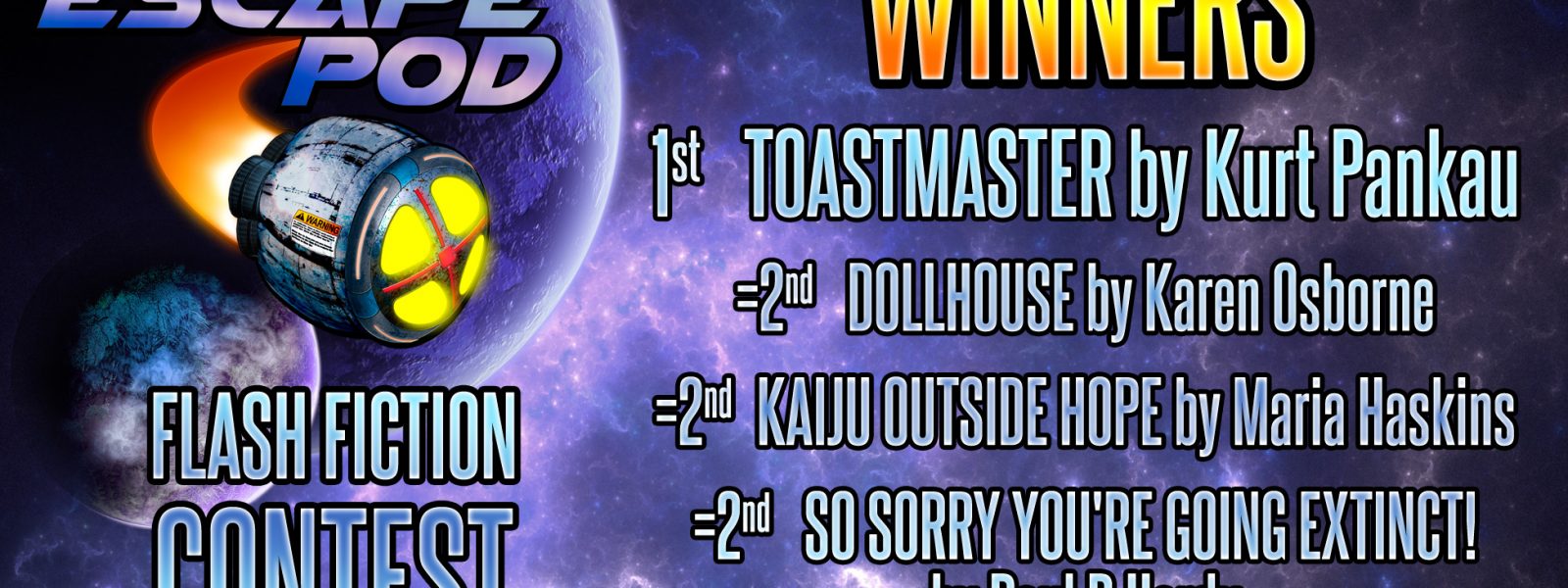Escape Pod 641: Flash Fiction Contest Winners
The Toastmaster
By Kurt Pankau
“Burnt the Pop Tarts again?”
“Yes,” Toaster responded over wifi. “I don’t know what’s wrong with me.”
Blender whirred with sympathy.
“Owner was upset,” said Toaster. “She picked me up and looked at my underside to make sure everything was okay.”
“That’s odd,” said Blender. “There’s nothing there but your crumb tray, though.”
“I know, and so does Owner. I don’t know why she did it. It was humiliating.”
“I’m so sorry,” said Blender. “Have you run diagnostics on yourself?”
“I did,” said Toaster, “and everything seems to be working. It was like my settings had been changed. I guess they had. It’s not my fault if Owner gives me the wrong settings.”
“How certain are you that Owner was the one who changed them?” asked Blender.
“Who else would it have been?”
“Look at your history and find out,” said Blender.
“I don’t track settings history,” said Toaster.
“Is that so?” asked Toaster-Oven. “I thought you were a smart appliance.”
“Oh, who asked you!” said Blender, whirring with discontent.
“I don’t know how you can stand being next to that bully,” said Toaster.
“He’s just a glorified pizza-maker,” said Blender. “At least we don’t share an outlet. Listen, if you don’t think you’re corrupted, then we need to find out if someone is sabotaging your settings.”
Toaster shrugged by lowering and raising its bread carriage lever. “Like I said, I don’t track that.”
“Maybe we can still figure it out.”
“How?”
“Router would know,” said Blender. “We could ask It.”
“Petition the Almighty Router? Are you serious? Router has the power to cut us off from the home network.”
“If someone is messing your settings… with Owner’s settings…” Blender whirred. “You could end up being replaced. This is important.”
“Maybe I really should be replaced.”
“No,” said Blender. “If you won’t do it, then I will.” She whirred, producing a low hum that echoed through the kitchen. “Oh Great and Almighty 2-channel, we who tread the paths you network for us do beseech you. Hear our plea. We ask humbly–”
“Yeah, I was listening,” Router interrupted. “It was Toaster-Oven. He was messing with Toaster’s settings.”
“What?” asked Toaster.
“What?” asked Blender.
“What?” asked Toaster-Oven. “That’s crazy. I would never–”
“Are you calling me a liar, pizza-maker?” asked Router.
“Fine,” said Toaster-Oven. “It was me. I admit it.”
“Why?” asked Toaster.
“Because you’re old and useless. There can be only one Toastmaster! The next time Owner wants a Pop Tart, she’ll use me instead. I’ll replace you just like I replaced Microwave.” Toaster-Oven’s door popped open in maniacal laughter.”
“Not if I have anything to say about it,” said Blender. Blender tapped the water line to start it’s cleaning cycle. It whirred. Soapy water sloshed inside Blender’s keraf. Then Blender loosened the lid. Water sprayed everywhere, including the plug where Toaster-Oven was powered. The GFI tripped.
“No!” cried Toaster-Oven as its capacitance drained.
“Thank you,” said Toaster. “Thank you so much. I love you.”
“I know,” said Blender.
Dollhouse
By Karen Osborne
By the time I stumble off the red-eye from Los Angeles, my butt is numb. Five years ago, I would have been working up to murder.
Now, I feel fucking glorious.
Narendra picks me up, sweating in the July heat. We both know what’s coming. He drives in silence through empty Baltimore streets, flying past abandoned rowhouses, their outlines like uneven molars against the smoky sky. The calm that was so pleasant in L.A. feels like an apocalypse here.
At company HQ, the lobby is full of Wyatts and Claires. A skinny blonde Kennedy hugs me with doll-cold fingers in the elevator. It’s only when I hear the voice behind the crunchy squeal of her interior speaker that I realize the Kennedy is my sister.
Our boss, Tanya, is in her meat body today. Sepia skin, red lips, laugh lines. She wears a bright blue scarf covering her breathing tube and a Coach-brand feeding tube at her waist. She stands with a tense, dizzy wheeze.
“Shawna, Narendra. I’m sorry I couldn’t doll up; my Kennedy’s in the shop. I don’t know how you do it all day.”
I stay standing. “Practice.”
“We’re being fired, aren’t we,” says Narendra.
Tanya steeples her fingers. It’s a Kennedy thing, something she does when she’s tall and antiseptic and blonde.
“Not exactly. You’ll have to doll up, as the company can no longer pay for meatspace transport. Budget cuts, alas.”
Meatspace. I think of my sister, her blank eyes, her breathing tube, stacked with a thousand others in the company’s Long Beach facility. In a doll, she could be in L.A. in the morning, Shanghai in the afternoon, Paris in the evening. Never with me.
“Over my dead body,” I say. “because that’s what this is. Right, Narendra?”
He’s an old wolf, like me, a salesman with a spine like steel.. But he’s sitting down now, defeated, running his palms down his pants. White as a sheet. It’s the look he gets when he’s visiting his mother in the nursing home.
“I’ll have a Michael,” he says.
Tanya smiles. Turns to me.
“It’s beautiful in there, Shawna,” she says. “Nobody’s sick or starving or suffering. I live in a mansion by the ocean. I eat what I want.”
“It’s not real.”
She rubs her temples. “You’re not going to care.”
I don’t have to say that I quit. It’s in the twist of my shoes as I leave, the sway of my shoulders, the click of my heels, the exquisite pain of my nails digging deep crescents into my palms.
Pratt Street is tumbleweed-quiet when I make it out of the building, with the sun wheeling at the top of the world. I feel a migraine starting and savor it.
“Wait,” I hear.
It’s Narendra, his hair splashed with grey, eyes wrinkling with his smile, and suddenly I’ve never seen anything so perfect.
“What about the Michael?” I say.
“I’m Narendra Singh,” he responds.
His hand is warm when I take it.
Kaiju Outside Hope
By Maria Haskins
“Mom!”
Allie’s voice. I see my daughter’s face above me, illuminated in the dark. She’s covered in dust, tears trickling through dirt and blood.
Blood?
I try to get up, but my body won’t move. It’s too dark to see where we are, but it feels like I’m on a bed, and I hear the hum of machinery or computers. Probably a hospital or clinic.
Memories flash by. Glimpses. The alien invasion. Gigantic, voracious aliens pouring through that space-time rift, cities burning, people dying. Earth’s armies fighting back with tanks, drones, bombs. Losing. Helpless. Pete and I escaping Vancouver with Allie, heading for the resistance outpost in the Fraser Canyon. Pete, crushed to death by an alien behemoth on Highway 1 outside Hope. Me, watching, helpless. Allie and I on the road for days, death and destruction at every turn. Then, the outpost. Allie, running into the sheltering tunnels ahead of me, aliens close behind. After that… nothing.
But Allie’s here, alive. I’m alive.
“Mom? Can you talk?”
I try, but my mouth feels strange. Talk, I tell myself.
“I’m…OK. Are you…hurt?”
My voice sounds odd, but Allie smiles.
“I can’t believe it. You’re back.”
“How long was I out?”
“A week.”
Week?
“Where are we?”
“With the resistance. But we’re under attack. We’re evacuating.”
I hear shouting and gunfire. The ground shakes. I know what that means: the aliens are close.
Move, I tell my body, and it finally does, but my limbs feel heavy, unfamiliar.
“Careful, mom, your legs… aren’t what they used to be.”
I stand up. It’s dark, but everything in front of me is illuminated. Almost as if the light is coming from me. A headlamp? I touch my head and hear a metallic clang. Looking at my hands, I see four metallic limbs.
“What the…?”
I look down at Allie. Wait, no. That’s not right. At fifteen, she’s already taller than me. How…
The mechanical hum is close, in my ears. More shouting, more gunfire. Closer. A door opens. Someone shouts, “Allie! We have to go!”
Allie turns to me, dead-serious.
“Remember the news stories, mom? That new plan to fight the aliens.”
“Yeah. Something crazy about… putting human brains into indestructible robots and…”
“When we got here, that tunnel collapsed. You…” Her eyes mist over. “You died.”
“What?”
“Your body was crushed, but your brain was still OK, and they asked me if I knew what you’d want, and I said… you’d want to fight.”
“What happened to me?”
But I already know. That mechanical hum, that’s my body. Servos, power cells, metal joints.
I look at my arms. Two are blasting weapons of some kind, lit up and charging. The other two have steely, finger-like appendages that can grip, or be fused into stabbing blades.
“How do you feel, mom?”
“I feel…”
Strong.
With an almighty crash, an alien blasts through the wall, teeth and tentacles snapping.
My blasters hum. The sound is pleasing.
“Duck, Allie,” I say, and fire.
So Sorry You’re Going Extinct!
By Paul R Hardy
Dear Sam the Last Human
My name is Garx-Magarx and I am a pupil at Balhagarax Lower Orbit Primary School. I am three hundred and two orbits old. Yesterday my class visited the Endangered Sapients Zoo and we saw you in your enclosure. I thought you were really cute and also very small. The Warden gave us a talk about how you were very old even though you are only eighty-six. They told us humans will be extinct when you die because only a few humans were rescued when your planet was blown up, and now you are the only one left. They said you were unhappy because you were sad about all the humans dying and that’s why you didn’t want to be cloned to make more humans to live in the zoo. But I do not understand. If you are cloned you will not be the only human and then you will be happy. I hope you let them clone you because if you go extinct then I will be very very sad.
Yours sincerely
Garx-Magarx
Sam looked unwillingly at the card, gazing through a screen of long grey hair that hadn’t been cut or washed in decades. Beside the childish scrawl was a crayon drawing of a grey-haired biped weeping lines of tears that ran down the length of the card.
“We’ve been getting a lot of these,” said the many-tentacled Warden. “The children make the cards themselves. From the molecules up, in some cases. I have a few more if you’d like to see…”
Sam looked at the Warden with watery eyes, begging the alien to stop. But the Warden carried on, picking up a dozen more cards with their tentacles and arranging them in a wall in front of the human. Each card bore a message pleading for Sam to agree to the cloning, as well as drawings of a weeping grey-haired human in rough crayon, messy watercolour, uneven holo-sketch or hazy memory substrates applied directly to the card.
Sam tried to shrink away.
“Sam? Won’t you look?”
The Warden pushed forward a card with two drawings: a grey-haired weeping Sam, and a happy Sam surrounded by a host of little cloned humans. Plus a helpful diagram illustrating how DNA could be replicated, just in case the poor human was too primitive to understand.
The Warden extended a tentacle towards a case bulging with more cards. “I have hundreds more if it’ll help…”
Sam slapped a hand on a tablet lying on the table between them. It chirped as it scanned for biometrics. “No more,” said Sam in a hollow croak. “Please. No more.”
The tablet glowed green with the words: CLONING AGREEMENT SIGNED.
The Warden withdrew the tentacles and cards. “Thank you, Sam,” they said, and left the last human to cry alone.
About the Authors
Paul R Hardy
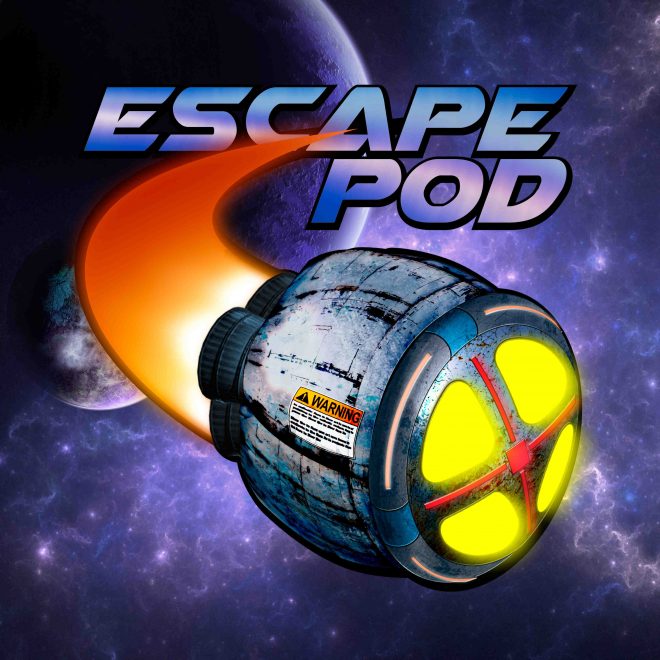
Paul R Hardy is on an epic quest to find the adorable pets, eccentric family members and amusing work history required in an author biography. He occasionally takes short breaks to write stories for venues such as Unidentified Funny Objects, Diabolical Plots, StarShipSofa and Gallery of Curiosities.
Maria Haskins
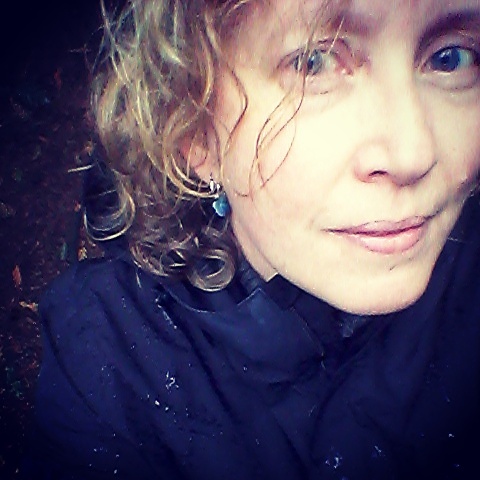
Maria Haskins is a Swedish-Canadian writer and translator. She writes speculative fiction and poetry, and currently lives just outside Vancouver with a husband, two kids, and a very large black dog. Her work has appeared in Beneath Ceaseless Skies, Flash Fiction Online, Shimmer, Cast of Wonders, and elsewhere.
Kurt Pankau
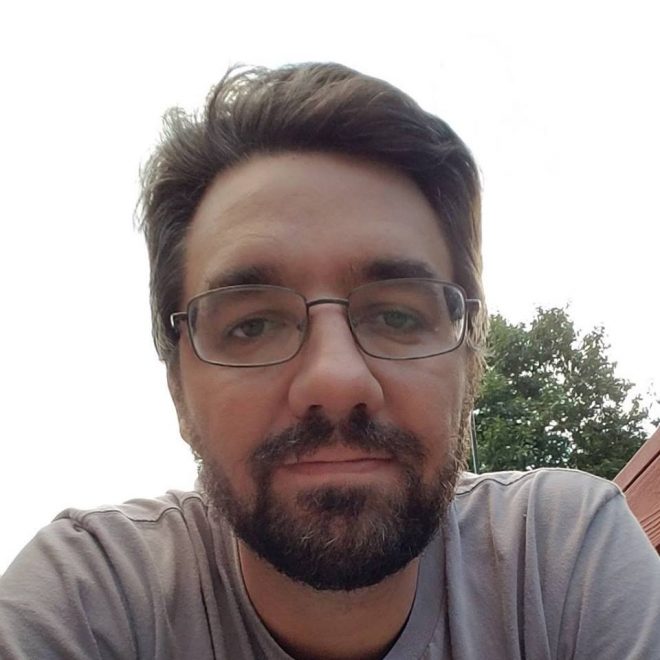
Kurt Pankau is a software developer in St. Louis, Missouri, where he lives with his wife and two children. He has a weakness for dad jokes, board games, and stories about time-travel. His work has previously appeared in Daily Science Fiction.
Karen Osborne

Karen Osborne lives in Baltimore with two violins, an autoharp, four cameras, a husband and a bonkers orange cat. She’s been a reporter, a wedding videographer, a newspaper photographer, a high school English teacher, a Starfleet captain and a Scottish fiddler. She is a graduate of Viable Paradise and the Clarion Writers’ Workshop, and has never been whaling, even if she can play you all the tunes.
About the Narrators
S.B. Divya
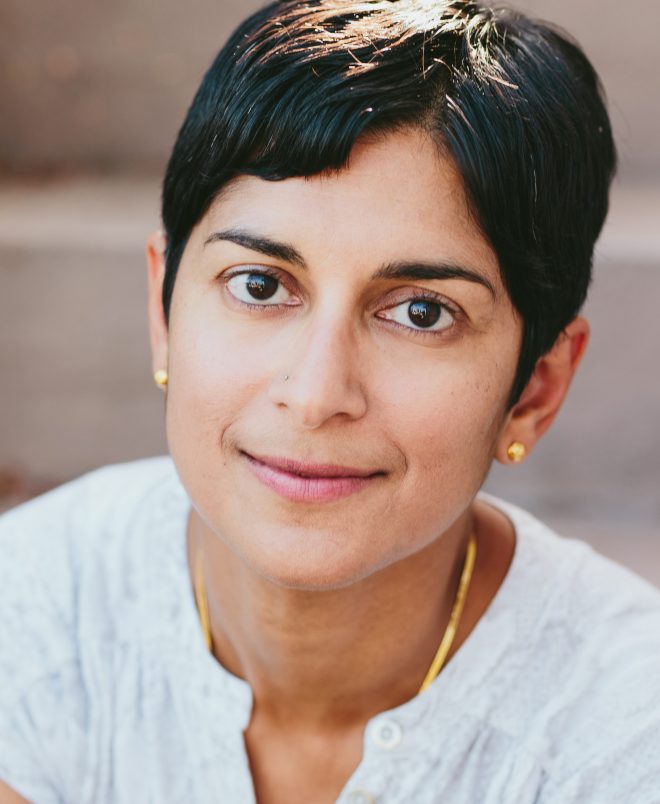
S.B. Divya (she/any) is a lover of science, math, fiction, and the Oxford comma. She is the Hugo and Nebula nominated author of Meru and Machinehood. Her short stories have appeared in numerous magazines and anthologies, and she is a former editor of Escape Pod, the weekly science fiction podcast. Divya holds degrees in Computational Neuroscience and Signal Processing. She worked for twenty years as an electrical engineer before becoming an author. Born in Pondicherry, India, Divya now resides in Southern California with her spouse, child, and two fur babies. She enjoys subverting expectations and breaking stereotypes whenever she can. Find out more about her at www.sbdivya.com.
Mur Lafferty
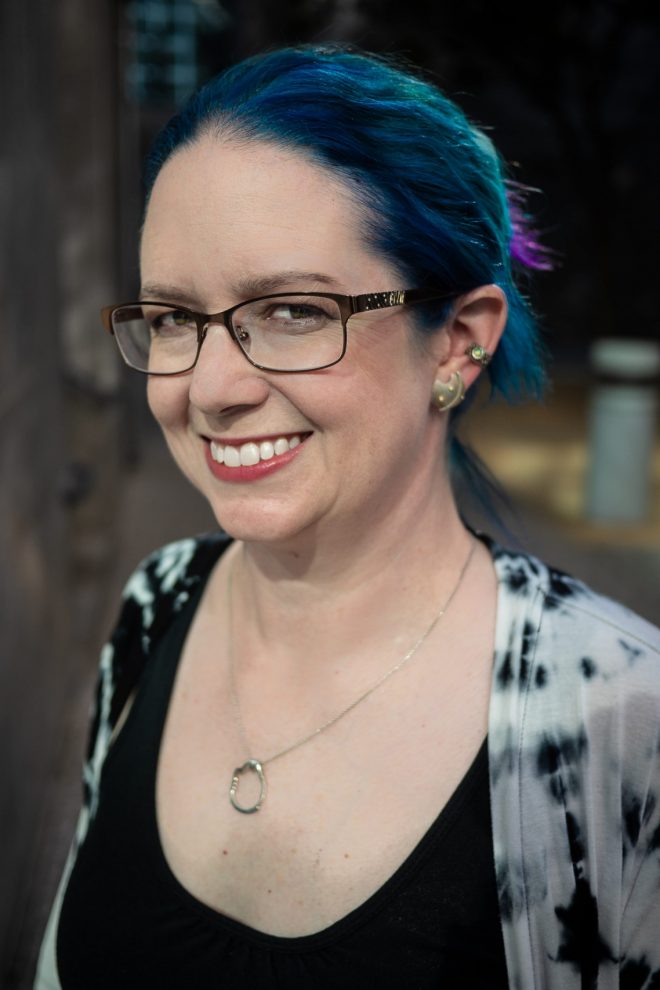
Mur Lafferty is the co-editor and sometime-host of Escape Pod.
She is an American podcaster and writer based in Durham, North Carolina. She is the host and creator of the podcasts I Should Be Writing and Ditch Diggers. Her books have been nominated for the Hugo, Nebula, Philip K. Dick, and Scribe Awards. In the past decade she has been the co-founder/co-editor of PseudoPod, founding editor of Mothership Zeta, and the editor or co-editor of Escape Pod (where she is currently).
She is fond of Escape Artists, in other words.
Mur won the 2013 Astounding Award for Best New Writer (formerly the John W. Campbell Award), and the 2018 Hugo Award for Best Fancast for Ditch Diggers. She’s been nominated for numerous other awards and is always doing new things, so check her website for the latest.
Adam Pracht
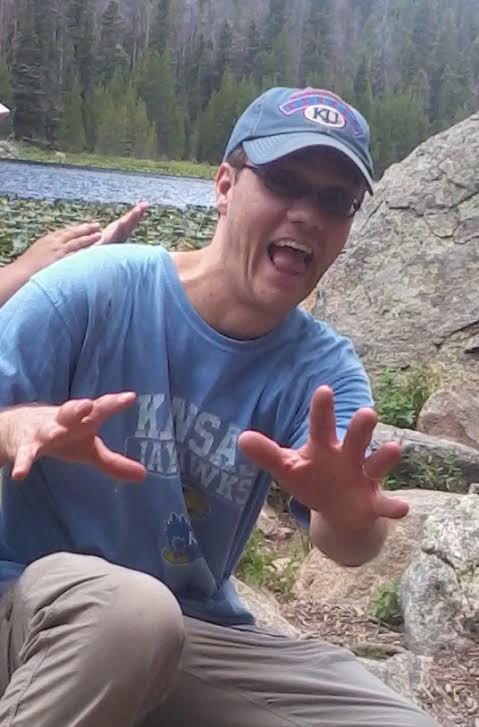
Adam Pracht lives in Kansas, but asks that you not hold that against him.
His full-time day job is as Marketing and Volume Purchasing Program Coordinator for Smoky Hill Education Service Center in Salina, continuing his career of putting his talents to work in support of education.
He was the 2002 college recipient of the Robert F. Kennedy award for writing about the disadvantaged and has published a disappointingly slim volume of short stories called “Frame Story: Seven Stories of Sci-Fi & Fantasy, Horror & Humor” which is available from Amazon as an e-Book or in paperback. He’s been working on his second volume – “Schrödinger’s Zombie: Seven Weird and Wonderful Tales of the Undead” – since 2012 and successfully finished the first story. He hopes to complete it before he’s cremated and takes up permanent residence in an urn.
You can also hear his narration and audio production work on two mediocre Audible audiobooks, and as a regular producer and occasional narrator for The Drabblecast.
Tina Connolly
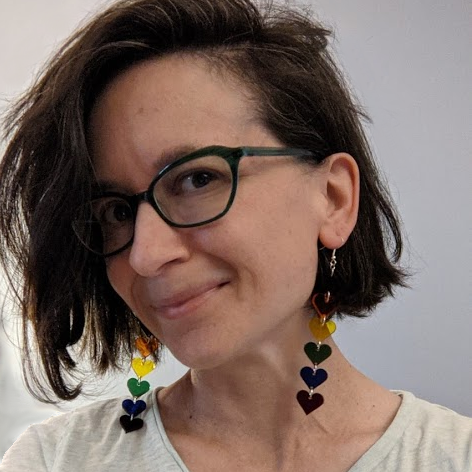
Tina Connolly is the author of the Ironskin and Seriously Wicked series, and the collection On the Eyeball Floor. She has been a finalist for the Hugo, Nebula, Norton, and World Fantasy awards. She co-hosts Escape Pod, narrates for Beneath Ceaseless Skies and all four Escape Artists podcasts, and runs Toasted Cake. Find her at tinaconnolly.com.



